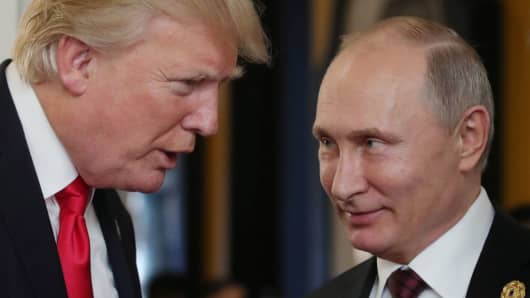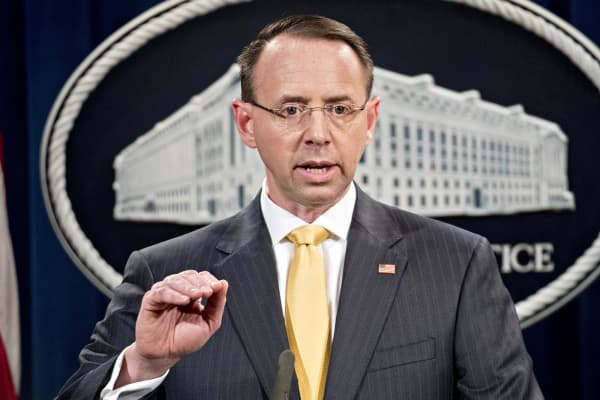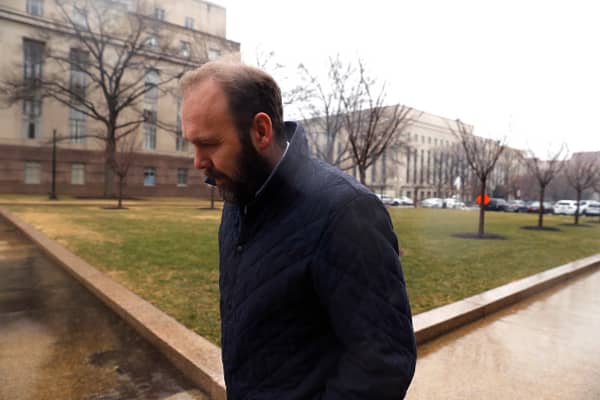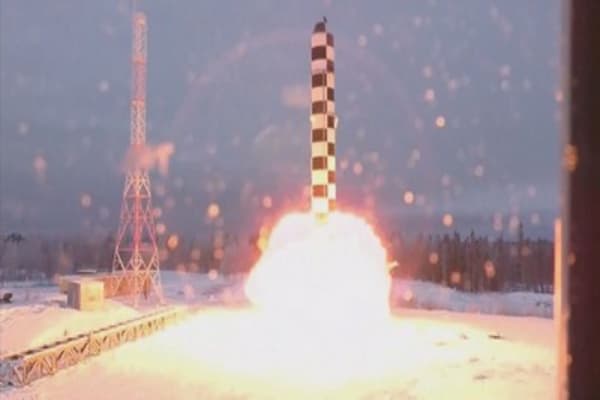Trump's embrace of Russia: The evidence on public display already paints a jarring picture
- Trump's in-plain-sight embrace of Russia gets obscured by the Trump news avalanche. It's worth reviewing what's been established so far.
- Long before running for president, Trump relied on Russian money.
- Trump consistently defends Russia and attacks U.S. officials investigating Russia.

Mikhail Klimentyev | AFP | Getty Images
US President Donald Trump and Russia's President Vladimir Putin at the APEC leaders' summit on November 11, 2017.
As Robert Mueller accumulates guilty pleas and cooperating witnesses, President Donald Trump stands behind a final redoubt: Nobody has shown he conspired with Russia in 2016.
Whether Mueller ultimately alleges such a crime remains unknown. He now has help from Trump's former national security advisor, deputy campaign chief and campaign foreign policy advisor — all of whom have admitted felonies.
But whatever the special counsel concludes legally about "collusion," evidence on public display already paints a jarring picture. It shows an American president who has embraced Russian money and illicit favors, while maintaining rhetoric and policies benefiting Russia and undercutting national security officials of his own country.
That in-plain-sight reality gets obscured by the Trump news avalanche. So it's worth reviewing what's been established so far.
Long before running for president, Trump relied on Russian money
His partners in the Trump Soho project in New York, announced in 2006, included a former official of the Soviet Union and a Russian who confessed to felony fraud involving organized crime. Son Donald Trump Jr. said two years later that money was "pouring in from Russia" for "high-end product."
The same year, a Russian oligarch paid Trump $95 million for a Florida mansion Trump bought in 2004 for less than half that price. Showcasing a family golf course in 2013, Eric Trump told a journalist that Russian financiers provided what American banks would not. (The younger Trump later denied saying so.)
Donald Trump openly courted Russian President Vladimir Putin while staging a beauty pageant in Moscow. With help from the same organized-crime-linked felon who collaborated on Trump Soho, Trump sought to develop real estate in the Russian capital while seeking the 2016 Republican presidential nomination.
Trump tapped campaign advisors with questionable ties to Moscow
As his 2016 campaign chief, he chose Paul Manafort. A Trump Tower resident since 2006, Manafort had received tens of millions of dollars from Putin allies in Russia and Ukraine.
As a top national security advisor, Trump chose Michael Flynn. In December 2015, Flynn got $45,000 from a Russian propaganda arm to attend a dinner with Putin.
As a foreign policy adviser, he named Carter Page — identified years earlier by U.S. officials as a potential Russian spy. He also tapped the expertise of a little-known 30-year-old named George Papadopoulos.
Trump embraced Russian campaign help, publicly and privately
Soon after becoming a Trump adviser, Papadopoulos heard from a professor in London that Russians had obtained email "dirt" on presidential candidate Hillary Clinton. He communicated with the professor repeatedly, trying to bring Trump and Putin together.
Weeks later, Donald Trump Jr. arranged a June meeting at Trump Tower to explore a Russian offer of damaging information on Clinton. "I love it," he had written of Moscow's outreach. Manafort and Jared Kushner, Ivanka Trump's husband, joined him.
Democratic Party emails that U.S. intelligence officials say Russia stole were released by front groups beginning later that month. Afterward, Trump publicly asked Moscow for more dirt.
"Russia, if you're listening, I hope you're able to find the 30,000 emails that are missing," he said in July.
"Russia, if you're listening, I hope you're able to find the 30,000 emails that are missing," he said in July.
In August, Trump's friend Roger Stone previewed forthcoming trouble for Clinton campaign chair John Podesta. In October, Podesta's emails, which U.S. intelligence says Russians also stole, were publicly released.
Trump consistently defends Russia and attacks U.S. officials investigating Russia
During 2016, Trump stood out for his warmth toward Putin. His campaign changed a Republican platform plank on Ukraine to make it more Russia-friendly.
After the election, American intelligence officials announced Russia had intervened to help Trump. In turn, Trump attacked them and emphasized Putin's personal assurances that Russia had not.
Before Trump took office, Flynn and Russia's ambassador secretly discussed sanctions imposed by President Barack Obama. Flynn later admitted lying to investigators about it.
Kushner, recently stripped of his top security clearance, discussed establishing "back channel" communications with Moscow using Russian facilities. When the June 2016 Trump Tower meeting with Russians became public last year, the president helped draft a false public statement concealing its purpose.
Alarmed by Russian interference, Congress passed new sanctions. Using discretionary power granted by the law, Trump hasn't implemented them. He fired FBI Director James Comey over the Russia probe. He routinely denounces Mueller's "witch hunt," even after guilty pleas by Flynn, Papadopoulos and Manafort's ex-deputy, Rick Gates.
Just as striking, Trump hasn't mobilized his administration to counter Russian cyberattacks. The National Security Agency director says Trump hasn't asked him to.
"President Putin has clearly come to the conclusion that there's little price to pay," Adm. Michael Rogers told Congress.
Inescapably, the source of that conclusion is the president of the United States.



No comments:
Post a Comment